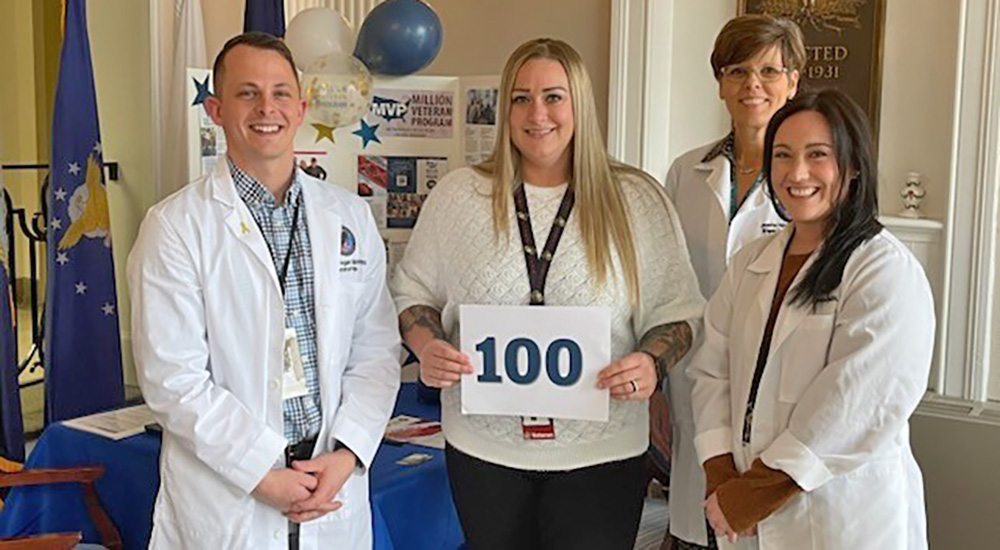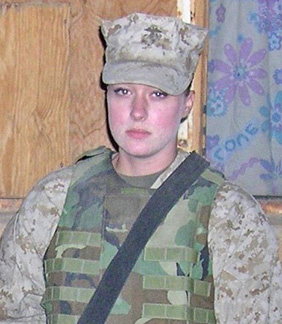When the first plane struck the World Trade Center, 17-year old Jennifer Higginbotham was standing by the vending machines in her high school break room, her eyes glued to the television. Like everyone else in her hometown of Kenosha, Wisconsin, she couldn’t believe what she was seeing.
As the towers began to crumble in Lower Manhattan, the world as she knew it had collapsed with them. “Right then, it was a feeling in my gut, I knew I was doing this,” she said.
The following spring, she walked across the high school graduation stage and into the Marine Corps recruiter’s office. “It’s going to be hard. It’s going to be tough, especially being a female,” the recruiter told Higginbotham. “Awesome,” she replied. “Sign me up.”
An ultimatum to enlist
Higginbotham had always been a daddy’s girl. Even though her father was an Army Veteran, he was reluctant to sign for his daughter, allowing her to enlist prior to her eighteenth birthday. American troops were already deployed in Afghanistan and soon the U.S. military would have boots on the ground in Iraq. Her parents were worried.
But Higginbotham was resolute. “Sign the papers and allow me to enlist now,” she remembered telling her parents, “Or I’ll sign them myself when I turn 18 in two months.”
Two war-time deployments
The first deployment to Iraq was loud, Higginbotham remembered. “You wake up to big booms. You go to sleep to big booms,” she said, on the incoming mortars and return fire near her airbase west of Baghdad.
She worked in logistics, running convoys to Fallujah, Blue Diamond, Ramadi and Al Asad. Sometimes, they’d drive through the desert at night in pitch black darkness to avoid detection by the enemy. Each time, she wasn’t sure if she’d make it back alive.
Five months after arriving home, she volunteered to go again. “My parents weren’t too happy,” she chuckled.
Coming home to VA
By the time Higginbotham left the military, she’d fallen in love with another Marine. She moved to his hometown in Barboursville, West Virginia, where they planted roots and have grown their family over the last 16 years.
But in those early years, the memories from two combat deployments stuck with her. The thundering explosions, the mortar fire, the dark nights riding in armored vehicles to Fallujah, the fear of not knowing whether she’d make it back to the airbase alive. All of this haunted the young mother of three.
Higginbotham finally reached out for help and found it at the Hershel “Woody” Williams VA Medical Center, where 15 years later, she still receives her care.
With the help of trained mental health professionals and the camaraderie of fellow Veterans, she broke down the stigma she had felt around her post-traumatic stress disorder. “There’s a sense of connection here I wouldn’t get anywhere else. At VA, you’re with your fellow brothers and sisters,” she said.
She now works in Peer Support at the same VA hospital. Every day, Higginbotham meets with Veterans who have reached out for help just as she once had. She shares her story and, in the process, offers the most treasured gift of all—hope.
A chance to keep giving
Recently, Higginbotham received a letter from a VA research program she didn’t recognize. She read about a biobank with more than 900,000 Veterans who had already signed up to share their health information with VA researchers.
Then she saw the words “genes” and stopped reading. She had too many questions and pushed the letter aside.
Not long after, the Women’s Health Program manager mentioned the same program to her at work. “It’s basically data collection,” her colleague explained. “Data that could help find new treatments and preventive care in the future or discover links between diseases that matter to Veterans.”
She thought about it. She trusted her colleague. “If there is anything that would improve care in the future, then I would be happy to be part of it,” she added.
100th Veteran joining Million Veteran Program at Huntington VA
Higginbotham made an appointment for the following week to enroll in the Million Veteran Program. She read the consent documents and had a chance to ask questions of the staff. She understood that researchers wouldn’t know her information and that it belongs to her. Anything that directly identified Higginbotham, like name or social security number, is removed from genetic information and health data before it’s shared with researchers to protect her privacy.
Already, data from Veterans in the program have supported some of the largest genetic studies to date on PTSD, major depression, heart disease, as well as groundbreaking research in suicide prevention. This is just the beginning of what their research has to offer.
With that, Higginbotham rolled up her sleeve and became the 100th Veteran at Huntington VA to enroll in VA’s Million Veteran Program, joining more than 900,000 Veterans nationwide in the program.
“Serving is in our blood,” she said. “That desire never goes away. I’m proud to be a part of this.”
Make a different for Veterans like you by joining VA’s Million Veteran Program. You don’t have to receive your care at VA to participate.
Topics in this story
More Stories
Study underscores important role COVID vaccination can have in protecting Veterans from infection and reducing long-term health consequences
Columbia VA’s robotic surgery teams completed their 800th robotic surgery and are on schedule to hit 1,000 by the end of the year.
In a decentralized clinical trial, Veterans can participate from their own homes or local VA instead of having to travel to a research site.








Would the veteran be informed if a dangerous genetic disorder was discovered that he or she should know about to inform their children going forward or would all this data just be collected without it’s known impact on their own families?
I applaud Ms. Higginbotham for her participation in the MVP and thank her for her service to our Country. In her work at VA, her participation MVP, and in so many ways, she continues to serve.
The genetic research done through MVP has the potential to positively impact Veterans in broad and significant ways, now and in the future. When women Veterans, like Ms. Higginbotham participate, the potential can be even more far-reaching. Clinicians know that women often respond differently to disease and to treatments, for example, than do men. The more we can learn through genetic research about gender-specific responses, the better targeted therapies, or even prevention strategies will be for all Veterans. MVP can help with these and other ground-breaking discoveries.
Thanks to all involved in this valuable program!